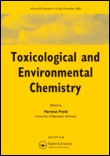
TOXICOLOGICAL AND ENVIRONMENTAL CHEMISTRY
Scope & Guideline
Unraveling the complexities of chemicals and their environmental effects.
Introduction
Aims and Scopes
- Toxicological Assessment of Chemicals:
Research focusing on the toxic effects of various chemicals, including heavy metals, pesticides, and pharmaceuticals, on biological organisms and ecosystems. - Environmental Chemistry and Pollution:
Studies that explore the chemical composition of environmental samples, pollutant degradation, and the fate of contaminants in different ecosystems. - Bioremediation and Waste Management:
Innovative approaches to remediation of contaminated environments using biological methods, including the use of microbes and plants. - Health Risk Assessment:
Evaluations of health risks associated with exposure to environmental toxins, incorporating statistical and modeling approaches to predict outcomes. - Nanotechnology in Environmental Applications:
Research on the use of nanomaterials for environmental remediation and their potential toxicological effects.
Trending and Emerging
- Biomonitoring and Ecological Impact Studies:
An increasing emphasis on biomonitoring of pollutants in various organisms, highlighting the need to understand ecological impacts and bioaccumulation of toxic substances. - Advanced Oxidation Processes (AOPs) for Degradation:
A growing focus on the development and application of advanced oxidation processes for the degradation of persistent organic pollutants, indicating an innovative approach to environmental remediation. - Endocrine Disruptors and Health Effects:
Research on the effects of endocrine-disrupting chemicals (EDCs) has gained momentum, reflecting heightened awareness of their implications for human health and wildlife. - Nanomaterials in Environmental Remediation:
A trend towards exploring the applications of nanotechnology in environmental remediation, particularly concerning the efficacy and safety of nanomaterials in degrading pollutants. - Oxidative Stress Mechanisms in Toxicology:
Increased studies investigating oxidative stress as a mechanism of toxicity, indicating a deeper understanding of biochemical pathways affected by environmental contaminants.
Declining or Waning
- Traditional Chemical Analysis Techniques:
While still relevant, there has been a noticeable decline in studies focusing solely on conventional chemical analysis techniques without integration of advanced methodologies or novel applications. - General Ecotoxicology Studies:
Research that broadly examines the effects of pollutants on ecosystems without focusing on specific chemicals or mechanisms has become less prevalent, as more targeted and mechanistic studies gain traction. - Historical Pollution Studies:
Investigations into historical pollution events or legacy pollutants have decreased, potentially due to a shift towards addressing current and emerging contaminants.
Similar Journals
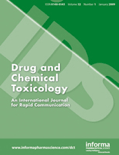
DRUG AND CHEMICAL TOXICOLOGY
Exploring the intersection of health and chemical science.Drug and Chemical Toxicology is a well-respected journal in the fields of toxicology, pharmacology, and public health, published by Taylor & Francis Ltd. Since its inception in 1978, this journal has diligently explored the effects and mechanisms of chemical exposures on health and the environment, fulfilling a crucial role in advancing scientific understanding and safeguarding public health. The journal is indexed across prestigious databases and features an impressive array of articles categorized within the Q2 and Q3 quartiles across various categories in 2023, reflecting its significance in Chemical Health and Safety as well as Environmental and Occupational Health disciplines. With an extensive reach and a focus on interdisciplinary research, Drug and Chemical Toxicology offers a rich repository of original research, reviews, and methodological advancements, catering to a diverse audience of researchers, professionals, and students dedicated to the betterment of safety and health standards. Although not an open-access publication, its articles are widely accessible to the academic community, ensuring that critical innovations and insights are shared for the greater good.

Toxicology Research
Illuminating the path to informed safety practices.Toxicology Research is a distinguished journal dedicated to advancing the field of toxicology through the dissemination of high-quality research. Published by Oxford University Press, this UK-based journal focuses on critical aspects of toxicology and mutagenesis, highlighting both environmental and pharmacological implications. With an ISSN of 2045-452X and an E-ISSN of 2045-4538, it serves as a valuable resource for researchers, professionals, and students alike. Currently categorized in the Q3 quartile for Health, Toxicology and Mutagenesis, as well as Toxicology in 2023, Toxicology Research maintains a visible presence in Scopus rankings, positioning itself within the targeted professional community. Although the journal operates without open access options, its importance in contributing to scientific discussions and policy formation is undeniable. Covering content from 2012 to 2024, it continues to provide insights into contemporary toxicological challenges, thereby fostering interdisciplinary collaborations and informing best practices in health and safety.

CHEMICAL RESEARCH IN TOXICOLOGY
Illuminating the path to safer chemical practices.Chemical Research in Toxicology is a premier journal published by the American Chemical Society, dedicated to advancing the understanding of toxicological effects associated with chemical substances. Since its inception in 1988, this esteemed journal has maintained a robust impact factor, ranking in the Q1 quartile for both Medicine (miscellaneous) and Toxicology as of 2023, reflecting its significance and influence in the fields of pharmacology and toxicology. With an impressive Scopus ranking at #16 out of 133 in the Toxicology category, it serves as a vital resource for researchers, professionals, and students seeking cutting-edge insights and scholarly articles that bridge the gap between chemistry and toxicological science. Although not an open-access publication, it continues to provide comprehensive analyses and original research that inform safe chemical practices and regulatory policies, further enhancing its role in public health and safety.

Toxicological Research
Pioneering insights into the impact of toxins on our world.Toxicological Research is a prominent academic journal dedicated to advancing the field of toxicology through rigorous exploration and innovative research. Published by the Korean Society of Toxicology, this journal serves as a vital resource for researchers, professionals, and students engaged in environmental science, pharmacology, and toxicology. With an ISSN of 1976-8257 and an E-ISSN of 2234-2753, Toxicological Research highlights significant findings and discussions in the realm of health, toxicology, and mutagenesis. Although not an open-access journal, it maintains a solid reputation as evidenced by its Q3 ranking in both health-related toxicology and general toxicology categories for 2023. The journal covers a broad spectrum of topics from fundamental research to applied toxicology and provides a unique platform for the dissemination of knowledge in a field that is increasingly relevant in today’s society. With an anticipated convergence period from 2008 to 2024, Toxicological Research continues to contribute vital insights to understanding the implications of toxic substances on health and the environment.
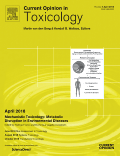
Current Opinion in Toxicology
Shaping Future Directions in Toxicological StudiesCurrent Opinion in Toxicology is a premier academic journal published by Elsevier, focusing on the latest advancements and perspectives in the field of toxicology. With an impressive impact factor reflecting its high citation and influence within the research community, this journal ranks in the Q1 category for Toxicology, positioned at #8 out of 133 in the Scopus Toxicology domain, placing it in the 94th percentile. The journal aims to provide concise and insightful reviews of contemporary research, fostering an understanding of critical issues related to toxic effects of chemicals and environmental agents. Although not an open access journal, it attracts a worldwide readership, making it an essential resource for researchers, professionals, and students committed to understanding toxicological science. Based in the Netherlands, Current Opinion in Toxicology serves as a platform for stimulating scholarly dialogue and guiding future research directions in this vital area of study.
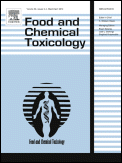
FOOD AND CHEMICAL TOXICOLOGY
Advancing food safety through rigorous toxicological research.FOOD AND CHEMICAL TOXICOLOGY, published by Pergamon-Elsevier Science Ltd, is a prestigious journal with a significant impact in the fields of food science, medicine, and toxicology, reflecting its Q1 and Q2 quartile rankings in various categories as of 2023. Established in 1982, this journal continues to serve as an essential platform for disseminating high-quality research focused on the toxicological assessment of foods and chemicals, aiming to advance knowledge that affects public health and safety. With a pivotal role in integrating diverse disciplines, including pharmacology and agricultural sciences, the journal ranks impressively within the top percentiles—specifically 95th in Toxicology and 92nd in Food Science on the Scopus metrics. Though it operates on a traditional subscription model, the journal is committed to providing valuable insights and findings to researchers, professionals, and students across the globe, making it a vital resource in the ongoing discourse around food safety and environmental health. Its comprehensive scope underscores its importance in shaping evidence-based policies and practices.

Food Additives and Contaminants Part A-Chemistry Analysis Control Exposure & Risk Assessment
Elevating standards in food science and toxicology.Food Additives and Contaminants Part A-Chemistry Analysis Control Exposure & Risk Assessment, published by Taylor & Francis Ltd, is a leading journal in the field of food science, toxicology, and public health. With an ISSN of 1944-0049 and an E-ISSN of 1944-0057, this esteemed publication has established itself as a vital resource for researchers and professionals involved in the analysis and regulation of food additives and contaminants. Since its inception and through its converged years from 2008 to 2012 and again from 2014 to 2023, the journal has maintained an impactful presence, notably achieving a Q2 ranking in diverse categories including Chemistry (miscellaneous) and Food Science, alongside commendable standings in Health and Environmental Health. The journal’s mission is to foster high-quality research by providing a platform for critical studies related to chemical analysis, exposure assessments, and risk management in food safety. By prioritizing engaging, peer-reviewed content, it aims to enhance understanding and mitigate risks associated with food additives, making it an indispensable tool for academics, practitioners, and policymakers alike.
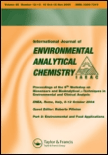
INTERNATIONAL JOURNAL OF ENVIRONMENTAL ANALYTICAL CHEMISTRY
Driving innovation in environmental analysis.INTERNATIONAL JOURNAL OF ENVIRONMENTAL ANALYTICAL CHEMISTRY, published by Taylor & Francis Ltd, stands as an essential resource in the interdisciplinary field of environmental science and analytical chemistry. With a history dating back to 1971 and a convergence period extending to 2024, this journal addresses urgent global challenges by providing a platform for high-quality research that encompasses pivotal aspects of environmental analysis, pollution, and public health. The journal’s significant impact is reflected in its 2023 rankings, placing it in the second and third quartiles across various relevant categories, including Analytical Chemistry, Environmental Chemistry, and Water Science and Technology. Researchers and practitioners are encouraged to contribute to its wealth of knowledge, making it a vital reference for emerging studies in Health, Toxicology and Mutagenesis and beyond. Although it is not an open-access journal, subscriptions provide unparalleled access to groundbreaking research that can influence both academia and industry practices.

Frontiers in Toxicology
Innovating Insights into Toxicity MechanismsFrontiers in Toxicology, published by Frontiers Media SA, is a prominent open-access journal dedicated to advancing the understanding of toxicological science. Established in 2019, it serves as a vital forum for innovative research, offering insights into the pharmacological impacts and toxicological profiles of various substances. With its international reach based in Switzerland, this journal has quickly ascended in the academic community, achieving a notable Q1 ranking in Pharmacology, Toxicology and Pharmaceutics (Miscellaneous) and a Q2 ranking in Toxicology as of 2023. The journal is indexed in Scopus, where it ranks #8 out of 43 in its primary category, underscoring its influence and relevance in the field. The scope encompasses cutting-edge studies on the mechanisms of toxicity, including both human and environmental impacts, making it an essential resource for researchers, professionals, and students alike. By promoting open access to high-quality research, Frontiers in Toxicology plays a crucial role in enhancing knowledge sharing and fostering collaboration across disciplines.
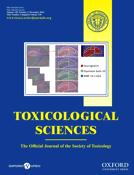
TOXICOLOGICAL SCIENCES
Championing Excellence in Toxicological ResearchTOXICOLOGICAL SCIENCES, published by Oxford University Press, is a premier journal in the field of toxicology that has been a cornerstone of scientific discourse since its inception in 1981. With an impressive 2023 impact factor and ranked in the Q1 category for Toxicology, this journal is highly regarded among researchers, professionals, and students dedicated to pharmacology and toxicology. The journal is committed to advancing the understanding of toxicological science, covering a breadth of topics that include the mechanisms of toxicity, risk assessment, and the regulatory aspects affecting public health. With an ISSN of 1096-6080 and an E-ISSN of 1096-0929, TOXICOLOGICAL SCIENCES facilitates open access scholarly work, ensuring that critical research reaches a global audience and promotes collaborative learning. As it converges towards 2024, the journal remains pivotal in shaping the future of toxicology research, providing insights that are essential for developing safer chemicals and protecting environmental health.